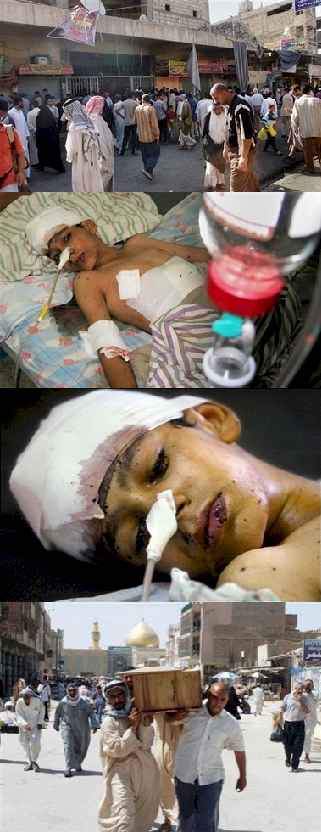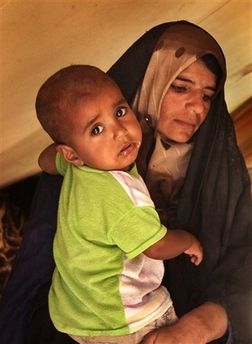IRAQ: Displaced children suffer depression and poor health - IRIN  - Twelve-year-old Barek Ahmed has been diagnosed as clinically depressed after his family was displaced by violence two months ago. Now living with his relatives in Baghdad, the boy laments the fact that he has left his school and friends behind, and will not be able to join a new school in the capital because of a lack of places so late in the year. - Twelve-year-old Barek Ahmed has been diagnosed as clinically depressed after his family was displaced by violence two months ago. Now living with his relatives in Baghdad, the boy laments the fact that he has left his school and friends behind, and will not be able to join a new school in the capital because of a lack of places so late in the year.
"Every year, I have the best results in my class and each day I felt I was getting closer to my dream to be a doctor," said Ahmed. "But I have missed out on the current year and couldn’t do my exams because we had to leave our neighbourhood after insurgents threatened my father. I don't feel excitement about anything now. The only thing I want is to return to studying because it was my dream and they took it from me." Ahmed is being treated by Dr Ibraheem Fatah Youssef, a professor of psychiatry at Baghdad University, who said that every month dozens of children come to him with the same problem: depression caused my lack of school attendance compounded by violence countrywide.
"These children have lost most of their freedom," said Dr Youssef. "For them, school is the only opportunity they have to run away from all this violence. If they lose that chance, they feel like prisoners in their own homes." According to the Ministry of Displacement and Migration, about 40,000 children have been displaced in Iraq due to ongoing sectarian violence since the attack on 22 February of a revered Shi’a shrine in Samarra. Most of them, said the ministry, do not have access to schools, and some of them do not have access to medical care. LACK OF EDUCATION "Even if they could go to school, many parents are afraid to let their children go while others have had to run away from their homes, causing children to drop out of schools," said Sarmad Abdel-Kareem, a senior official in the Ministry of Education. Abdel-Kareem added that 60 percent of displaced children will have to repeat their current year in school, when they return, because of time or examinations missed. Teachers in Baghdad schools say that those displaced children who return to classes struggle to keep up with their peers and fare poorly in exams. "The students I have who are from displaced families have forgotten a lot of the knowledge they previously had," said Nawal Izidin, a teacher at a primary school in Mansour district. "They are like babies learning how to write again." Dr Youssef said that this was a common phenomenon in Iraq's schools and warned that with continued displacement occurring, the country's entire education system will be jeopardised as standards will inevitably fall. "If some students are suffering from depression, not only will it be detrimental to them, but to the rest of their class as the teaching environment becomes more difficult and stressful," he said. POOR HEALTH Another problem that displaced children face is lack of access to medical facilities. Dr Muhammad Jarnon, a clinician at the Children’s Paediatrician Hospital in Baghdad, said that with many families having to move from one place to another, as a result of violence, child health concerns are not a priority. "Because they cannot afford a doctor or public health services are far away, they wait until a particular problem becomes critical before they act," Dr Jarnon said, adding that the main illnesses diagnosed in displaced children are malnutrition, water-borne diseases and diarrhoea. Dr Jarnon said that most of these diseases could be prevented if they were brought to the attention of doctors earlier, but that the real cure to the problem would be to end displacement altogether and ensure that families live in clean and safe places. "Sometimes medicines are not enough to cure a disease," said Adel Maruan, a senior official in the Ministry of Health. "We are trying to offer them the best living environments in order to keep diseases at bay, but we have to accept that children have a more delicate immune system and are more prone to catch diseases than adults under these displacement conditions."
Notes: IRIN is a UN humanitarian news and information service.
Erdla | 

 - Twelve-year-old Barek Ahmed has been diagnosed as clinically depressed after his family was displaced by violence two months ago. Now living with his relatives in Baghdad, the boy laments the fact that he has left his school and friends behind, and will not be able to join a new school in the capital because of a lack of places so late in the year.
- Twelve-year-old Barek Ahmed has been diagnosed as clinically depressed after his family was displaced by violence two months ago. Now living with his relatives in Baghdad, the boy laments the fact that he has left his school and friends behind, and will not be able to join a new school in the capital because of a lack of places so late in the year. The bombing in Hila — a mostly shi'ite town in Southern Iraq yesterday night killed at least 30 people and injured at least 60. The graphic to the left shows some of the aftermath as follows:
The bombing in Hila — a mostly shi'ite town in Southern Iraq yesterday night killed at least 30 people and injured at least 60. The graphic to the left shows some of the aftermath as follows: As of the end of April, over 68,000 persons have been displaced due to a recent upsurge of violence since the Samarra Mosque bombing of February 22nd. Some reports from the MoDM have cited figures of up to 100,000 persons displaced across the country.
As of the end of April, over 68,000 persons have been displaced due to a recent upsurge of violence since the Samarra Mosque bombing of February 22nd. Some reports from the MoDM have cited figures of up to 100,000 persons displaced across the country.